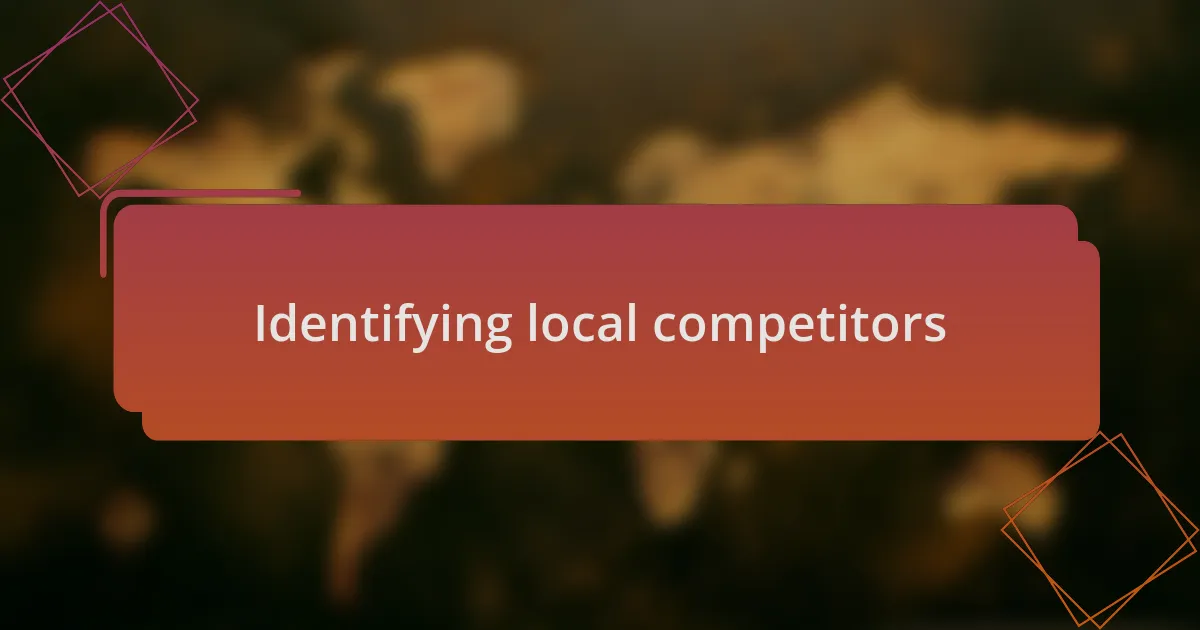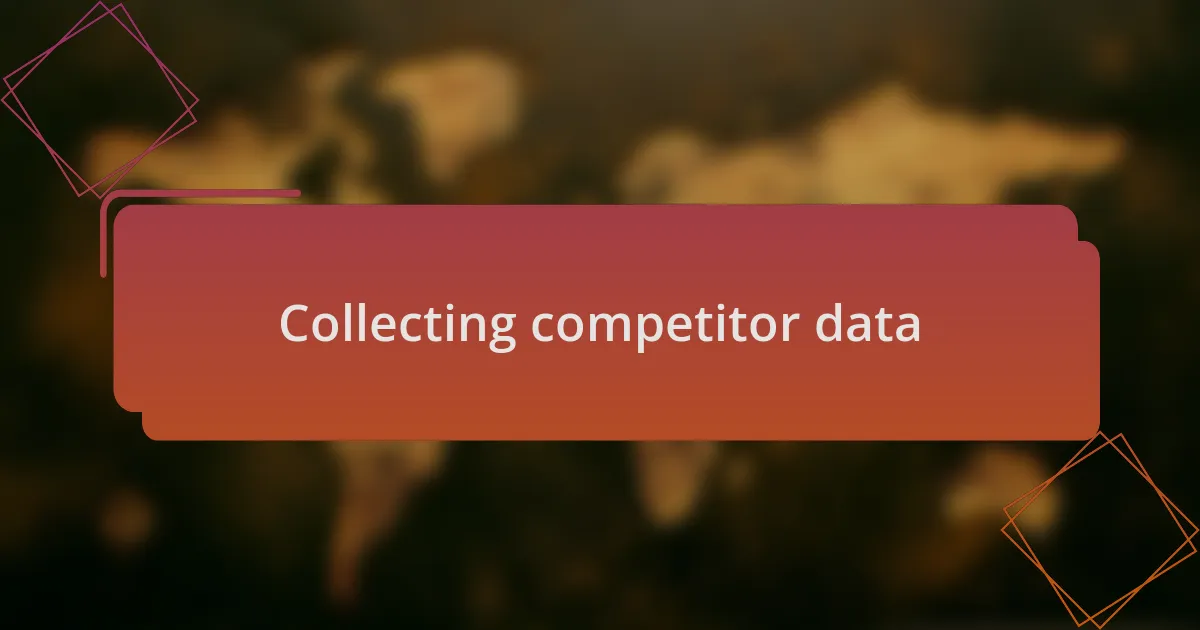Key takeaways:
- Local search engines prioritize geo-targeting and local authority, making accurate business information crucial for visibility and user trust.
- Competitor analysis reveals market gaps and successful engagement strategies, allowing businesses to adapt and refine their own offerings.
- Effective use of local keywords, customer reviews, and community engagement enhances visibility and strengthens customer loyalty.
- Applying insights from competitor strategies helps in implementing timely promotions, optimizing SEO, and leveraging customer feedback for improved brand connection.

Understanding local search engines
Local search engines are specialized platforms designed to connect users with businesses in their vicinity, often offering tailored results that enhance the search experience. I remember my first time trying to find a local restaurant while on a road trip; it was impressive how quickly I could discover options right around me. This immediacy is one of the key advantages of local search—providing results that not only showcase proximity but also relevance.
One of the fascinating aspects of local search engines is their reliance on local data. When I worked on optimizing a client’s business listing, I realized just how crucial it was to ensure accurate information like address, operating hours, and customer reviews were present. This data empowers users to make informed decisions and builds trust in the local business community. Have you ever wondered how often your information is updated on these platforms? Keeping it accurate can significantly impact your visibility.
Finally, local search engines often tailor their algorithms to prioritize different factors than traditional search engines, focusing heavily on geo-targeting and local authority. I noted that reviews and ratings can play a pivotal role in how businesses rank in local searches. It’s a delicate balance between creating a robust online presence and genuinely engaging with the community, as these factors tend to resonate more with local users. How do you think your personal experiences with local businesses influence the way you search for them?

Importance of competitor analysis
Understanding your competitors is essential in local search, as it provides insights into what works and what doesn’t within your market. From my experience, analyzing competitor strategies has revealed powerful tactics I hadn’t initially considered. For instance, reviewing their customer engagement on social media not only showcased their communication style but also highlighted what resonates with local audiences.
Additionally, competitor analysis allows you to identify gaps in the market. I remember noticing a local business that was thriving by offering a unique service that others overlooked. This revelation prompted me to explore similar, unaddressed needs within my own community. Have you ever thought about what your competitors might be missing? Finding those opportunities can set you apart and serve your local clientele better.
Ultimately, staying informed about your local competitors can help shape your strategic decisions. I often reflect on how I’ve adjusted my own approaches based on competitor successes and failures. It’s not just about imitating their practices but understanding their impact on customer preferences. This has led me to constantly refine my offerings to better meet local demands.

Identifying local competitors
Identifying local competitors is an essential step in gaining a competitive edge. I usually start by searching for businesses within my niche using local SEO tools. Just recently, I stumbled upon a competitor’s website that had strong local keywords in their content. It made me wonder, how can I be more strategic with my own keyword choices to attract a similar audience?
Another useful method is to explore local directories and review sites. When I was looking for businesses in my area, I discovered a competitor with numerous positive reviews. This experience struck me; it was clear that their customer service was a key factor in their success. It led me to question my own practices and how I could enhance the customer experience in my offerings.
Finally, I often check social media platforms to see which businesses are actively engaging with the local community. One time, I noticed a competitor hosting a community event that drew a crowd. This not only helped them strengthen their local presence but also provided a unique opportunity for connection. Have you considered how community engagement could elevate your own brand? It’s these real-life interactions that can influence customer loyalty in ways that traditional marketing simply cannot.

Collecting competitor data
To collect competitor data effectively, I often begin with website audits. Sitting at my desk, I’ve spent hours analyzing competitors’ on-page SEO elements, from meta tags to internal linking structures. It’s fascinating to see how small tweaks can lead to big changes in their search performance. This makes me think: what hidden opportunities could I be missing in my own website?
Next, I take a closer look at their backlink profiles. I remember when I discovered a competitor had secured high-quality links from reputable local blogs. It hit me that this could significantly boost their authority and visibility. Have you ever wondered where you could gain similar backlinks? Understanding the sources of their links can inspire my own outreach strategies.
I also monitor their content strategy. For instance, I once noticed that a rival regularly published engaging blog posts around local events. This piqued my curiosity about my own content approach. Are there local topics I haven’t explored that would resonate with my audience? By analyzing what works well for them, I can refine my own content to better meet the needs of potential customers.

Analyzing local SEO strategies
When I dive into analyzing local SEO strategies, I often focus on how competitors utilize local keywords. I recall a time when I stumbled upon a competitor ranking for phrases I had overlooked. It was a lightbulb moment; these keywords were essential for engaging the local community. Have you considered which local terms might attract your neighborhood audience?
Local business listings are another critical area I scrutinize. I found it enlightening to see how some competitors perfectly optimized their Google My Business profiles with rich descriptions and high-quality images. I started to wonder: could enhancing my own profile in the same way elevate my local visibility? Such optimizations can significantly impact how businesses appear in local searches.
I also explore customer engagement through reviews and ratings. A year ago, I discovered a competitor with a staggering number of positive reviews, which elevated their credibility and trustworthiness in the eyes of potential customers. It made me reflect on my own review strategy. How can I inspire happy clients to share their experiences? By prioritizing customer feedback and actively managing online reviews, I realized I could build a stronger local presence and foster community trust.

Evaluating strengths and weaknesses
When I evaluate the strengths and weaknesses of local competitors, I start by looking at their online presence. I recall a local café that had a fantastic website with an interactive menu and beautiful imagery. It struck me how this visual appeal could draw in customers; I had to step up my own website’s game to compete effectively.
On the flip side, I’ve noticed some businesses that, despite having a decent number of reviews, lack timely responses to customer feedback. This oversight became evident during my research when I saw how a slow response time frustrated potential patrons. I thought, could I create a more engaging experience by promptly addressing my customers’ opinions? This self-reflection made me realize that being responsive is just as important as generating reviews.
Another aspect I delve into is social media engagement. I came across a local service provider who thrived on Instagram by showcasing behind-the-scenes content. Their ability to connect with followers resonated with me—sometimes it’s not just about the product but the relationship built around it. Have I been missing opportunities to connect personally with my audience? It became clear that fostering a community can be a significant competitive advantage in local search.

Applying insights to improve strategy
To enhance my strategy based on competitor insights, I reflect deeply on the types of promotions that resonate within my local market. For instance, I’ve noticed that several successful businesses frequently run seasonal specials, drawing in crowds eager for limited-time offers. This led me to consider, what if I introduced flash sales aligned with local events? It’s all about leveraging that urgency, and I realized that a well-timed promotion could really boost engagement and foot traffic.
Another critical takeaway from analyzing my competitors is the importance of local SEO. One competitor stood out with content tailored to community-specific keywords that increased their visibility. I immediately thought, am I optimizing my content adequately? By incorporating localized keywords that reflect my customers’ needs and interests, I’ve seen a measurable uptick in organic traffic. It highlighted for me just how essential it is to not only understand the landscape but also to adapt my strategies to fill gaps in my own presence.
Lastly, I find that utilizing customer feedback effectively can set me apart. I once attended a workshop where a speaker stressed the value of testimonials in building trust. This sparked a realization: am I effectively showcasing my own customers’ experiences? By prominently featuring positive reviews and creating case studies, I can build a stronger connection with potential clients. It’s a powerful reminder of how deeply insights into competitor strategies can guide me in refining my approach and achieving greater success.